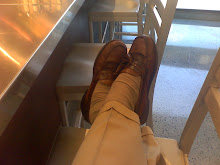My correspondent said something about Vatican II being the cause of the ruination around us.
I had to disagree, as I have with several correspondents lately. I'm starting to be more precise when I talk to people about Vatican II. A European priest I've heard speak once said that things weren't so great in the Church before the Council--the sorts of problems we have now were evident in the decades before it. Perhaps Evelyn Waugh's observations regarding the time before the Reformation, which I started to pass off as my own in a post last week, could also be applied to the time before the Council, or at least immediately before it.
The Council was not the cause of the ruination around us. We all know the name of the person who is the cause--we need not name him--and we all know (as did St. Pius X) the ideology, or set of ideologies, which was the cause--modernism. The Council was merely a vehicle for a pre-existing phenomenon, not a cause.
Case in point, blithely presented in This Far by Faith, vol. 1, page 154, which I read when I was in possession of the books a few weeks ago:
Another of Archbishop O'Hara's far-sighted programs was his introduction of English into liturgy. In addition, he had been so convinced of the value of lay participation in the Mass, that in 1949 he combined these two concepts in the Community Mass. He asked members of the Diocesan Council of Catholic Men to introduce the new ritual. While the celebrant spoke Latin softly, leaders chanted or spoke the English translation and he congregation, following a booklet provided, gave the response. St. Aloysius and St. John the Baptist [now defunct] in Kansas City reported enthesiastic participation when the Community Mass was chanted on Holy Name Communion Sunday, the Second Sunday of each month. Some parochial schools used a spoken version called the Dialogue Mass in the early 1950s. Although the Community Mass disappeared by the late 1950s, later developments at Vatican II indicated that Archbishop O'Hara had been on the right track. [emphasis added]
Well, was O'Hara on the right track? Or was he encouraging something that was clearly forbidden by the Church? (Hint: you can Google "Mass Vernacular Forbidden Pius" and find out). It had to have been an abuse. It had to be disobedience. Vatican II didn't cause this abuse. This disobedience was encouraged by--it originated with--none other than the Kansas City Ordinary himself (who had, interestingly, been made a sort of honorary Archbishop by Pius XII) well before the Council.
There are certainly more stories to be told regarding illicit pre-Conciliar experimentation just in the official Kansas City-St. Joseph diocesan history (including folk singing at Mass before 1965), much less in the unofficial history here and elsewhere. If any others of you have local anecdotes from back in the old days, do pass them along.


No comments:
Post a Comment